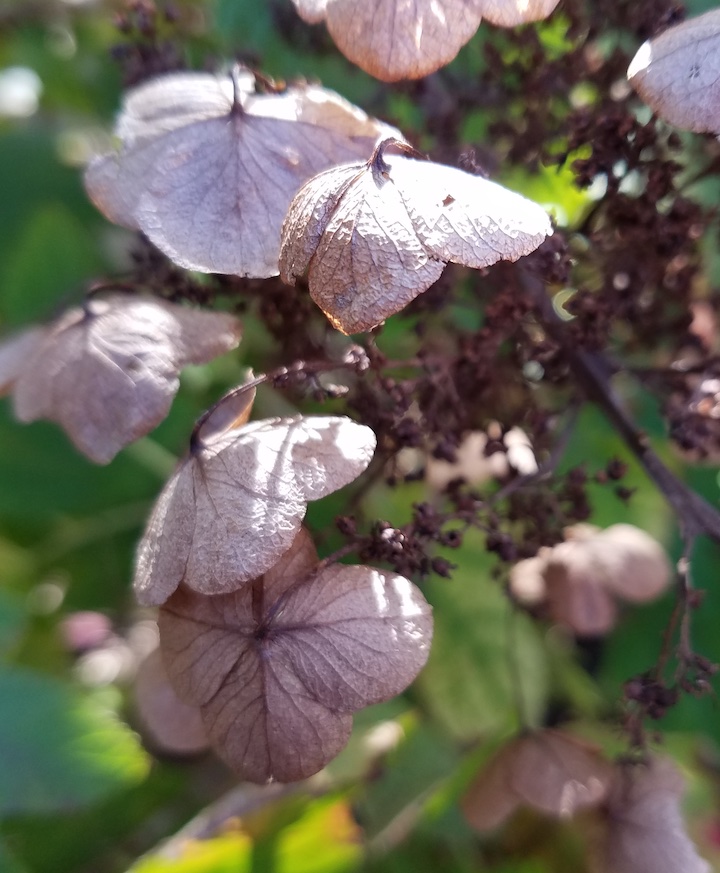COVID Garden Diary
Dialogues with nature in a time of pandemic
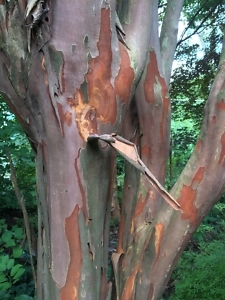
“Everything that rises must converge,” writes Flannery O’Connor. True, in my post-white Christmas gardens, the shoulders of ornamental grasses and the hydrangeas’ leaden heads do rise, slowly, from the saturated ground. The rouge of autumn, tawny just days ago, now a sodden sepia — but the flattened Lenten roses bud from the crown, a gladness here on January’s front stoop. Mainly branches down from the snowfall, though a crepe myrtle split nearly in half. I fetch my loppers from the shed, thinking I might bite through the last tendon. The wood creaks, resists my twisting the still-joined arm, a sheer muscle of swirled tan, moss green. I stand and jump on the cockeyed branch, no release. There must be grief in this wounding, some yaw in the xylem and phloem that won’t easily unlatch. I’ve seen my share of untimely passing — those spirited away with so much light left to bear, those severing ties without once looking back. Even the living must sometimes sacrifice root and limb, whether choosing it or not, for newness to bud from the heart of things. Though we fight every step up and out, we ascend by sheer muscle of will, purpose, and service. The convergence is with our highest and best self. The blade of change slices our tender middle; we smooth the jaggedness of some force we didn’t see coming. We callus over, the eye of breakage a strange gratitude. Our belief in good lifts the melting away.
***
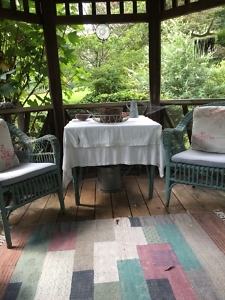
Today I barely beat the rain to cut back a wild-haired spirea, chartreuse in spring and summer with snowflake flowers — but in that spot, under a neighbor’s weed tree, it always darkens with a fall fungus. I stuff the black stalks in the bin, step on lemon balm and oregano. Their scents commingle, like dinner on the grounds, like a flag raised among the wounded. Sometimes the field of our story is equally ruined. We are sometimes the leaving and sometimes the left. At 11, I left my troubled mother for my stepmother’s olive branch. Between us, a singed no man’s land of attrition. When I see my mother now in the nursing home, we want to get close and touch. She marvels at my hair, the same blinding white. She knows that something happened in our past but, over the blaring TV, can’t put her finger on it. To get to her, I walk through the waste I chopped off in light rain until my arms ached. I lean to speak in her good ear. I can’t say her voice is the balm of herbs crushed underfoot, a voice that once froze me to the bone. I can’t say the air of bodies waiting to die doesn’t make me sick, but a little peace creeps in. Along the way, I have been both the leaving and the left — the seed and the dung — both needed to till the ground, to bear fruit. My mother lets herself stand in the field of some small memory of a daughter she lost. I let myself take her silky hand.
***
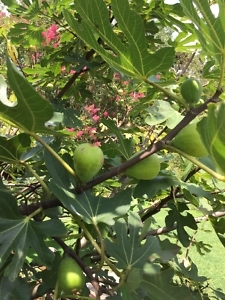
My first summer in 10 years without fresh figs from my brown turkey fig tree, which grew to skim the power lines, almost hiding my car in full leaf. I ate handfuls, drizzled sometimes with honey and feta, gave them away, wrote about them. Their late fruiting, my summer farewell. Gradual blush, pale green to gold. Scrotal on the outside, uterine within, ripe in palm and teeth. Those bursting on the limbs I left for bees and wasps. Oh, the wasps. When my daughter heard how tiny female wasps burrow in to lay their eggs, she swore off figs. Then my mouth and tongue burned. My arms and hands burned. The milky sap from the stem end in picking is latex — and I became allergic to those handfuls, that too much of a good thing. In spring, when branches rotted to the heart, likely from last fall’s long drought, I decided to let it go. Though the tree would’ve sprouted new from the base, I stood in its ruins: Time to surrender. Like so much these last seven years after farewelling marriage. Surrender to the sting of grief and loss. To circumstance. To my own part in our parting. To parts of me stolen, rebirthed from the ground up. To breathing on my own. Surrender, Dorothy, written like neon in the sky. The branches and roots released easily. I dragged them to the fence and swung them over to the brushpile. Now only ghost figs, dream figs, memory figs. Gone, the unbidden prize at my fingertips.
***
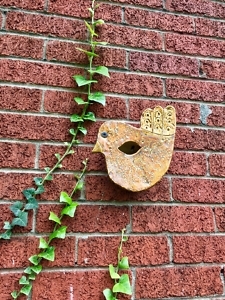
The birds were more aggressive this spring and summer of isolation, although aggressive to me is merely protecting the bald babies in the many nests — tucked into burning bushes, hydrangeas and hollies, the weed tree that towers over the fenceline. Especially the mockers, their icepick beaks, their sleek divebomb from phone and cable lines. I time my weeding and trimming to their hunting hours, gauging whether the coast is clear from the back door. Sometimes I miscalculate. Huff, at my head. Huff, at my back and shoulder. I scold and shoo. I use an umbrella, no good for two-handed weeding but fine for taking out the trash. I borrow my granddaughter’s bike helmet to mow. To the car and back on rare errands, my purse over my head. The babies fledge, the harangue quiets. In the leeks and brandywines, I still duck and cover by instinct. I look to the skies for sharp, winged threats. Maybe this global period of alertness, wariness, and shrinking from other human contact has imprinted on our consciousness, our reflexes. Maybe it will be years before our muscles fully relax when entering a store or crowd, our impulse to fight or flight embedded in our brain’s synapses. Huff, huff. Tell me, when will we come through this long night and break our fevered pitch? When will my hand reach out to yours as we stand tall and bareheaded once again?

Copyright (c) 2021 by Linda Parsons. All rights reserved. Linda Parsons is a poet, playwright, and the copy editor for Chapter 16. She is the poetry editor for Madville Publishing and reviews editor for Pine Mountain Sand & Gravel. She writes and gardens in Knoxville, and her fifth poetry collection is Candescent (Iris Press, 2019).

